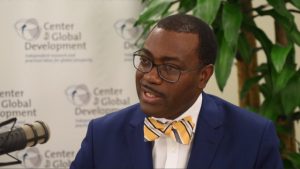President of the African Development Bank (AfDB), DrAkinwumi Adesina, says Africa needs to frontload investments in green infrastructure space through private sector financing.

Adesina, who made this known at the ongoing 2023 Annual General Meeting of the AfDB in Sharm El Sheirk, Egypt, said: ”Economies must compliment public finance by mobilising resources from the private sector for the development of the continent.
”To mobilise more climate financing, AfDB inaugurated the African Financial Alliance for Climate, adding that this was with a view to bring together all financial institutions, stock exchanges in Africa to green the financial ecosystem
“Financial ecosystem should incorporate climate financing into all their operations. Valuation of companies on the stock exchanges based on the greening on their portfolios will provide incentives for green investment across Africa.
“The use of green bonds can mobilise global refinancing for Africa and that is because Africa currently accounts for just 0.2 per cent of the $2.2 trillion or cumulative green bonds issued up till 2022.”
The AfDB, he said, issued more than $10 billion of green and social bonds in the past 10 years.
“We must do more, to green infrastructure space of Africa through private sector financing and that is why the AfDB, Africa 50 and partners launched the alliance for green infrastructure in Africa,” he said.
According to the AfDB president, the initiative will accelerate private sector investments in bringing energy, green urban infrastructure systems, green hydrogen and climate resilient infrastructure.
He added that the group hoped to mobilise $500 million of project preparation and project development financing using climate equity platforms and $10 billion private sector financing for green infrastructure in Africa.
“A good example, is our recent provision of €195 million as partial credit guarantee to spur republic of Benin, to raise $500 million on global capital markets
“Our Board of Directors approved a $345 million partial credit guarantee to support Egypt to raise $500 million for private financing for green growth through issuance of its first ever sustainability Panda bond.
“As the world moves, the transition to electric power abounds; Africa stands to be able to attract billions of dollars in private investment for greening global transport system.
“This is because it has 80 per cent of the global deposits of platinum, 50 per cent of cobalt, 40 per cent of nickel and substantial deposits of lithium,’’ he said.
Adesina warned Africa not to make the same mistakes, but rise up to manufacturing lithium ion gas, to enable it tap into the future market.
According to him, the cost of establishing lithium ion in Africa is three times less expensive.
He said that to mobilise lot more private climate change and green growth, governments and development partners should take five key approaches.
He said they should establish national development plan for green transition, subsidise green energies to foster growth and multilateral and bilateral institutions should provide guarantees to help the risk investment by the private sector.
He also said that support should be provided for the preparatory and development of bankable projects that would provide high risk adjusted returns to the private sector.
He further said that existing public finance infrastructure should be transferred to the private sector to mobilise more private sector resources for greener infrastructure.
Also speaking, the President of the Arab Republic of Egypt, Abdel Fattah El-Sisi, noted that collective effort of countries on the continent was required to mitigate the effects of climate change, the pandemic as well as recent Russia-Ukraine crisis.
El-Sisi urged Multilateral Developing Agencies and institutions to revise the conditions of finance to Africa to allow low income countries thrive.
This, he said, is especially with the increase on the loan conditions and the debt services with all the negative effects on public finances.
According to him, the problem of climate change and the negative consequences is not limited to a state or certain region.
“It is an existing issue that should be ahead of all the development priorities of all countries of the world.
“And so the negative impact is aggravated to less developed countries which is very clear on the African continent. And such consequences are increase in the levels of drought and desertification.
“The decrease of agriculture, and indications related to drought in Africa led to losses that exceed 70 billion dollars and reduced agricultural production by 34 per cent.”
El-Sisi stressed that financing requirements, needed to face such negative consequence of climate change, which is expected to rise by three trillion dollars till 2030.
The AfDB 2023 annual meetings which began on May 22 will end on May 26.
The meetings comprise of the 58th Annual Meetings of the Board of Governors of the AfDB and the 49th Meetings of the Board of Governors of the AfDB as well.
The theme of the 2023 Annual Meetings is “Mobilising Private Sector for Climate and Green Growth in Africa”.
The meeting is expected to provide a framework for Bank Group Governors to share their experiences with galvanising private financing domestically and internationally.
It is also expected to harness natural capital to bridge the climate financing gap and promote the transition to green growth in Africa.
By Lucy Ogalue
